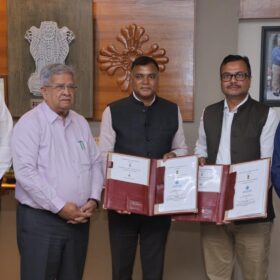Reaffirming its commitment to fight climate change, India has set another ambitious target to set up 500 GW of renewable energy capacity by 2030. The announcement was made by ministry of new and renewable energy secretary Anand Kumar at the 17th meeting of the International Renewable Energy Agency (IRENA) council in Abu Dhabi.
Speaking at the Council, the minister expressed confidence that “India would have installed 175 GW of RE capacity by 2022 without taking into account large hydro and 225 GW including large hydro.”
Of the targeted 175 GW by 2022, 100 GW is to come from solar projects (60 GW utility-scale and 40 GW rooftop solar). Wind power projects will contribute 60 GW.
At the Council, the minister highlighted the fact that fighting against climate change and adoption of renewable energy is a matter of faith and commitment for India. He also shared the efforts being made by India for de-dieselisation of the farm sector.
Seeking IRENA’s role in enhancing capacity of renewable energy institutions in member countries, the minister suggested focus on innovation and new areas like hydrogen as energy carrier and storage.
Significantly, the renewables energy ministry had recently sought proposals on gravity storage and solar-driven hydrogen production research, in order to deal with the fluctuating nature of renewable power and for grid balancing.
The strong renewables growth has been seen as a key marker of Modi government’s power sector reform success. The government is going all out with the aim of ensuring the electrification of all railways by 2022 and turning renewable energy into a popular movement with steps including an emphasis on solar farming.
Soon after assuming first term in office in 2014, the government steeply revised the targets from then-20 GW to 100 GW of solar installations by the year 2022. The establishment of the International Solar Alliance was also looked upon as another landmark success of the Indian government to highlight its global initiative and contribution in the renewable energy sector.
This content is protected by copyright and may not be reused. If you want to cooperate with us and would like to reuse some of our content, please contact: editors@pv-magazine.com.









By submitting this form you agree to pv magazine using your data for the purposes of publishing your comment.
Your personal data will only be disclosed or otherwise transmitted to third parties for the purposes of spam filtering or if this is necessary for technical maintenance of the website. Any other transfer to third parties will not take place unless this is justified on the basis of applicable data protection regulations or if pv magazine is legally obliged to do so.
You may revoke this consent at any time with effect for the future, in which case your personal data will be deleted immediately. Otherwise, your data will be deleted if pv magazine has processed your request or the purpose of data storage is fulfilled.
Further information on data privacy can be found in our Data Protection Policy.